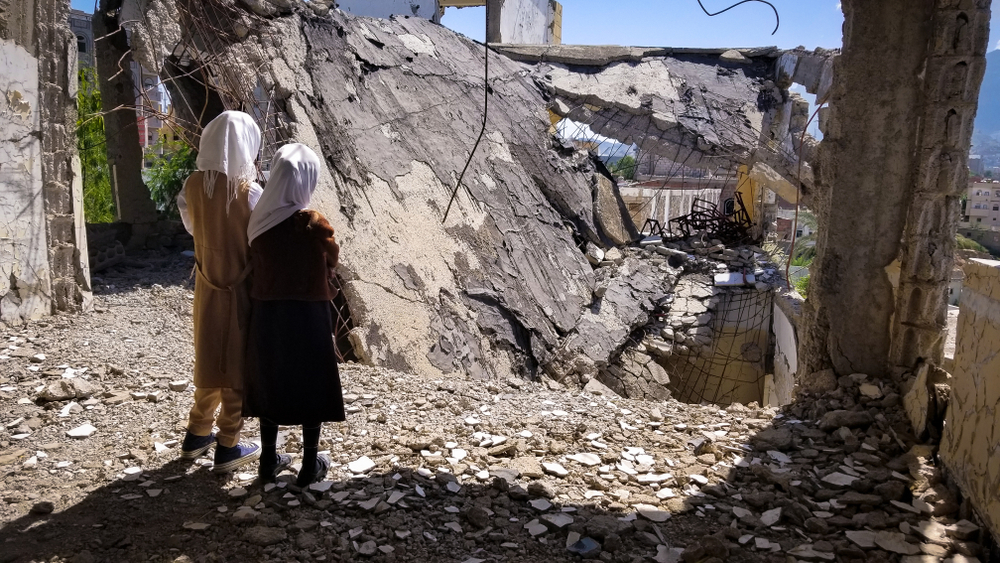by Jonathan Fenton-Harvey
The Houthi rebels’ attack on Saudi Arabia’s southwestern Abha International Airport, which injured 26 civilians and hospitalized eight, symbolizes heightening tensions in the four-year-long war in Yemen and the failure of the current peace talks.
Just days before the attack, a Houthi spokesperson promised on Twitter that the faction would target Saudi and Emirati airports, in response to Saudi Arabia’s blockade of Sanaa airport. After the attack, the Houthis confirmed their previous claim that it was a response to Saudi Arabia’s suffocating policies on the country.
Saudi Arabia presents the attack as an act of Iranian aggression. “In light of these terrorist and immoral transgressions by the Houthis, the coalition will take strict measures urgently and carefully to deter them,” Saudi Arabian Colonel Turki Al Maliki, the top spokesman for the coalition in Yemen, said on June 12. “The terrorist elements responsible for planning and carrying out this attack will be held accountable.”
On Thursday, Riyadh had already pounded Sanaa as a response to the attack and vowed to confront the Houthis with “unwavering resolve.”
As Saudi Arabia’s use of force continues, it will push the Houthis to further target Saudi territory. Although they can threaten southern territory, especially with the attack on Abha airport, the Houthis have limited experience in hitting precise targets at long-range, so it is unlikely that they will successfully take the fight deep into Saudi territory.
For Riyadh however, the attack serves as a perfect justification to prolong their war efforts, destabilize and control Yemen, and empower their own ruling candidate. Furthermore, Saudi Arabia claims that previous Houthi missiles struck close to Mecca, which it presents as a threat to a key Islamic holy site.
Though Houthis have received limited support from Iran, they are not an Iranian proxy and have other reasons for pursuing their goals. This narrative of “Iranian proxies” has been damaging to peace efforts. The UAE Minister of State for Foreign Affairs Anwar Gargash has also argued that the Houthis are responsible for the violence and are also a proxy. The UAE, not Saudi Arabia, has already spearheaded the attack on Hodeidah and will likely further up pressure against the Houthis.
According to reports of the Houthis advancing inside Saudi territory, the faction is directly threatening parts of the kingdom. As a result, Riyadh may feel compelled to take harsher action and not just target the Houthis with airstrikes. It has already imposed a harsh blockade on Yemen’s airports, along with multiple sea and land ports, and could now seek to impose harsher restrictions.
Ultimately, Yemenis will suffer the most, especially as Saudi Arabia struggles to suppress the Houthis, who excel at fighting and navigating in Yemeni territory. The war has already restricted the flow of vital goods. Even when goods are available, Yemenis struggle to afford them due to high unemployment and inflation. With cholera once again spreading, Yemen’s humanitarian crisis, which the UN already calls the world’s worst, could deepen.
Rather than scaling back support for Saudi Arabia because of its harmful role in Yemen, Donald Trump has embraced the narrative that the Houthis are an Iranian proxy and sold $8 billion of weapons to Riyadh in May, on top of America’s already vast support to the coalition. This comes amid congressional efforts to halt Washington’s support for the Yemen war.
Congressional support for ending America’s participation in Saudi Arabia’s war could be a key factor in forcing Saudi Arabia to back away from Yemen and support peace negotiations, as the United States has leverage over the kingdom. Future peace talks must strongly address Saudi Arabia’s role which increasingly aggravates tensions, rather than just focusing on the Yemen war, to prevent the conflict deepening.
Though responsible for numerous violations, the Houthis have seemingly kept their word and pulled back from the Hodeidah ports a month ago, according to the head of a UN mission patrolling the sites. If Saudi Arabia’s campaign ended, the Houthis could be more receptive to peace talks. Indeed, only by Saudi Arabia easing its blockade on Yemen could a peaceful solution become feasible in this complex, multi-faceted conflict.
Jonathan Fenton-Harvey is a roaming journalist and researcher who focuses on conflict, international relations, and humanitarian issues within the Middle East and North Africa. He has particularly focused on the Yemen conflict, Libya and Gulf Cooperation Council (GCC) regional foreign policy. He has also studied history and Middle East studies at the University of Exeter, in the United Kingdom. Follow him on twitter: @jfentonharvey






Seems that Iran is responsible for security of US and allies no matter what crimes they commit!
Saudi should be ashamed fighting Muslims in Yemen. Where does it say in the Qur’an or Hadith that Muslims should fight Muslims. Soudi government is so stupid and corrupt that they don’t see the ploy of the Zionist Isreal and the west to divide the different sects of Muslims inorder for the Zionist regime to take over the entire middle East while Muslims are busy fighting and killing each other.
Ismail
Saudis do not consider the Shia to be Muslims.
They are not completely wrong; Salafis, as well as Orthodox Sunni Islam, are separate religions from Shia Islam. You only need to attend a Shia religious gathering in shrined of the Imams in Kerbala or in Mashad to sense that.
Saudi Salafis hate Shia Islam, it is in their blood, unfortunately.
The Sunni-Shia split goes back to blood spilled in the time of the Prophet (PBUH) and for leadership of the Umma afterward. Among many key differences is the Shia hierarchy, obtained either by birth or scholarship. No Ayatollahs chosen to be closer to God than anyone else – in Sunni theology that is actually as blasphemous as the Christian Trinity. Intolerance seems sadly universal.
Charles
Islam does not have much of a theology.
What is has is a sort of peripatetic philosopy, like Medieval Christian philosophy, and presently extant only among a small minority of the Shia.
They, the Sunnis, started first. Only in Iran and in India large Shia communities are safe.
And only among the Shia you will find softness and delicate feelings; Orthodox Islam is austere and dry.